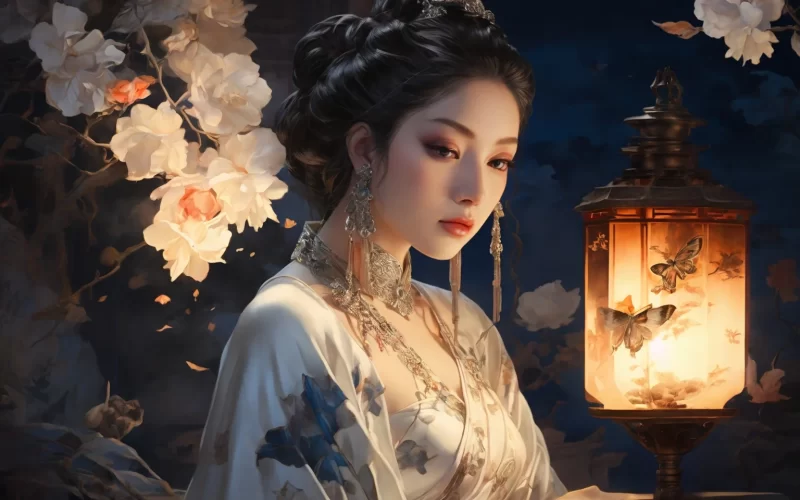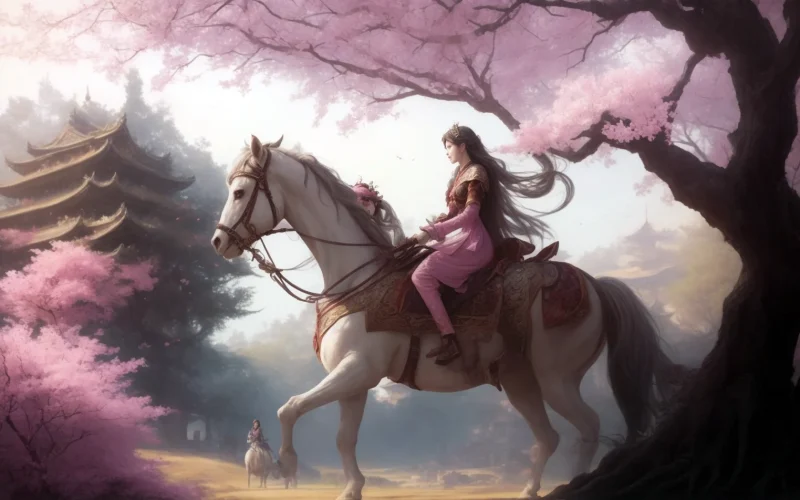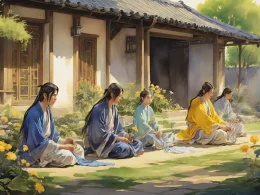The sun has gone slanting over a lordly roof And red-blossoming branches have leaned toward the dew Since the Emperor last night summoned a new favourite And Lady Yang's bright smile came through the curtains.
Original Poem
「集灵台 一」
日光斜照集灵台,红树花迎晓露开。
昨夜上皇新授箓,太真含笑入帘来。
Interpretation
Composed during Emperor Xuanzong's later years of indulgence in sensual pleasures and favoritism toward Consort Yang, this work by Zhang Hu stands as a masterful critique of courtly extravagance and the abuse of power. Historical records note how the Yang sisters—riding on their sister's imperial favor—"entered and exited palace gates, their influence overwhelming the realm." Beneath its surface praise, the poem delivers profound social commentary on the emperor's controversial relationship with his daughter-in-law turned concubine and her calculated charms, its delicate phrasing concealing pointed observation.
First Couplet: « 日光斜照集灵台,红树花迎晓露开。 »
Rìguāng xié zhào jí líng tái, hóng shù huā yíng xiǎo lù kāi.
Sunlight slants across Ji Ling Terrace; Blossoms, flushed with dawn's dew, unfold.
The opening paints Huaqing Palace's picturesque serenity—slanting light, dew-kissed blooms—a seemingly idyllic spring scene. Yet this luxuriant imagery subtly mirrors Yang Yuhuan's beauty and newfound favor: the "flushed blossoms" symbolize both feminine allure and triumphal ascent. The decadent splendor serves as prelude to the couplet's human drama.
Second Couplet: « 昨夜上皇新授箓,太真含笑入帘来。 »
Zuóyè shàng huáng xīn shòu lù, Tàizhēn hán xiào rù lián lái.
Last night, the Sovereign bestowed new Taoist rites— Then Taizhen, smiling, stepped behind the curtain.
Here, the "bestowed rites"—a Daoist ceremony conferring spiritual titles—becomes a veneer for imperial indiscretion. Yang, adopting the monastic name Taizhen, enters "smiling," her coy demeanor revealing both her calculated seduction and the court's moral compromise. The poet's choice of "smiling" captures her coquetry while suggesting the emperor's complicity—a collaboration masked as sacrament.
Holistic Appreciation
Cloaked in apparent admiration, the poem delivers nuanced social critique. The opening's radiant scenery glorifies Yang's environs and ascendancy, while the second couplet's ceremonial pretense and "smiling" entrance expose the theatricality of power. Taizhen's coy entry—a single, telling detail—illuminates the mechanics of desire and influence, the poem's refined tone amplifying its subversive power.
Artistic Merits
The poem exemplifies the art of critique through apparent praise. Its elegant language and structure—scene-setting followed by revelatory action—conceal social commentary within decorous form. The closing image achieves layered meaning: through subtle suggestion, it unveils institutionalized hypocrisy, demonstrating how poetic restraint can sharpen observation.
Insights
This "palace poem" reveals how opulence obscures moral compromise—a timeless caution against mistaking ceremony for virtue. Zhang Hu reminds us that truth often resides in subtle gestures: a smile, a curtain drawn. In an era of performative governance, his verse models how art might examine power's theatrics, revealing the fragility beneath gilded surfaces.
Poem translator
Kiang Kanghu
Zhang Hu (张祜, 785-849 A.D.) was a poet from Qinghe in the Tang Dynasty, he wrote more than a thousand poems in total. In his early years, he lived in Gusu, but in the middle of Changqing, he was not recommended by Linghu Chu. He was rejected by Yuan Zhen, so he went to Huainan and lived in seclusion in Danyang Qu'a. During his life, Zhang Hu made remarkable achievements in poetry. Zhang Hu was named after his poem "Three thousand miles from his homeland, twenty years in the deep palace", and his 349 poems are included in The Complete Tang Poems.











